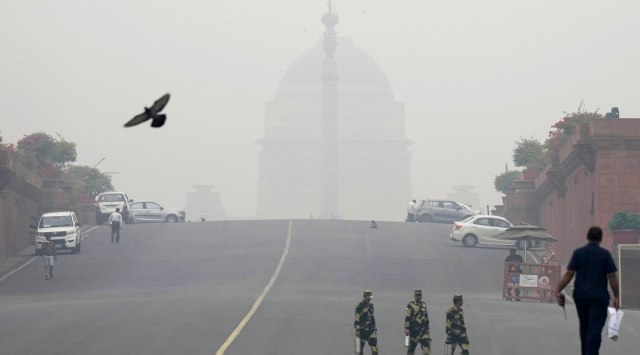Stay updated with the latest - Click here to follow us on Instagram
Drones and AI tools to help tackle Delhi pollution
The Commission for Air Quality Management had called for project proposals from researchers, scientists or NGOs for ‘technology interventions’ to deal with Delhi’s air pollution.
 Security personnel walk amid low visibility due to smog, at Kartavya Path in New Delhi, Tuesday, Nov. 8, 2022. (PTI Photo/Manvender Vashist Lav)
Security personnel walk amid low visibility due to smog, at Kartavya Path in New Delhi, Tuesday, Nov. 8, 2022. (PTI Photo/Manvender Vashist Lav)The Commission for Air Quality Management (CAQM) has roped in scientific institutions for seven projects to work on aspects of air pollution in the Delhi-NCR region.
Seven proposals have been approved by the CAQM, according to a communication issued on Thursday. These include one by CSIR-NEERI, Nagpur, to use artificial intelligence and machine learning tools to count vehicles using CCTV footage. The data is then expected to help prepare emissions inventories which help ascertain sources of pollution.
Another project that has been approved is by the Thapar Institute of Engineering and Technology, Patiala. This will involve the use of drones for real-time air quality monitoring at pollution hotspots in the NCR.
SASTRA University, Thanjavur, will deploy an “air purification system” at a market in Delhi-NCR on a trial basis with a target of reducing pollution levels by 25-50%. The technology is based on aerodynamics, according to the communication from the CAQM.
Automotive Research Association of India, Pune, will conduct trials on retrofitting two- and three-wheelers (autorickshaws) with electric drive. These vehicles will then be deployed to collect data.
A “filter-less air cleaner” in buses is another project by IIT Delhi and Swachh.io that has been approved by the CAQM. It involves retrofitting buses with these “air cleaners” based on aerodynamics.
The Decision Support System (DSS) by the Indian Institute of Tropical Meteorology (IITM), Pune, has also been listed as a proposal that has been approved. The DSS will help identify the sources of pollution in Delhi and eight neighbouring districts – Faridabad, Ghaziabad, Gurgaon, Noida, Jhajjar, Sonipat, Baghpat and Rohtak. The DSS currently provides hourly data on emission sources in Delhi.
Time limits and budgetary allocations have been laid out for these projects, according to the CAQM.
In May this year, the CAQM had called for project proposals from researchers, scientists or NGOs for “technology interventions” to deal with air pollution. According to the notice issued while calling for proposals, these projects are to be completed within two years of being sanctioned.







